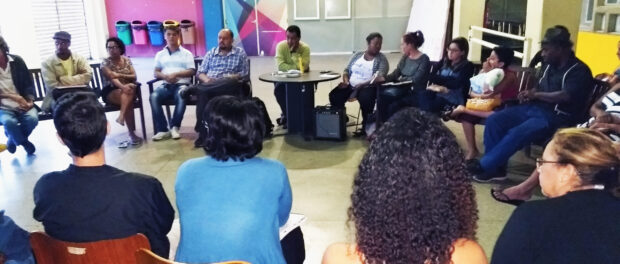
“Reading ought to be an act of love,” said Paulo Freire. For residents of Manguinhos, a cluster of favelas in Rio de Janeiro’s North Zone, the mere existence of a space such as the Parque Manguinhos Library is symbolic of the possibility of reinventing our relationship to the place we live, work, and develop our emotional life. A library in the favela. A place that has been historically neglected, left vulnerable, attacked. A place where the guarantee of basic rights is a daily struggle.
Launched in April 2010 as part of the Growth Acceleration Program (PAC) in Manguinhos—a program of socioeconomic and urban public policy projects delivered by the federal government—the Parque Manguinhos Library was intended as a new point of reference for a vision of culture and literature in the city’s periphery. With a physical structure and a calendar of activities similar to that of a cultural center, and maintained by the state government, the space housed a variety of artistic groups from a wide range of disciplines: theatre, music, poetry, visual arts, film, and dance, creating rich experiences of social participation. The Ballet Manguinhos, the theatre troupe Manguinhos Onstage, the Manguinhos Eco-museum, the Manguinhos Poetry Soiree and the Fala Manguinhos! newspaper are just a few of the entities that used the library’s space for their community activities. And residents, students, and workers visited the library daily, creating a vibrant civic life amidst the stacks of books.
In 2016, staff began to receive notice of the library’s closure, and a series of resignations followed. Within a year, management of the library had been transferred to the City of Rio de Janeiro, already indicating the impending financial slowdown of the state government. The deepening of the economic crisis, with resources being concentrated in the key areas of education and health care, prompted the closing of organizations such as the Casa da Mulher, which had provided legal and psychological assistance to women who were victims of violence. And the same fate awaited the Parque Manguinhos Library.
Residents, workers, and artistic collectives of Manguinhos immediately began mobilizing to save the space. They called for the library to be reopened, for the space to be made available again to residents and artistic and cultural groups, and for it to be operated by the community of Manguinhos. The fight to save the Parque Manguinhos Library soon found its place on the area’s mobilization calendar. There were public protests and complaints of human rights violations, with access to culture seen as fundamental to the advancement of citizenship and human dignity. In March 2017 organizers held a demonstration in Manguinhos at their Second Cultural Saturday entitled “I Just Want to Be Happy: Saving the Culture of the Favela Where I Was Born.”
Then in May, after months with no answers or concrete actions from the government, the new Superintendent of Reading and Knowledge from the State Culture Secretariat finally acknowledged the demands of the collectives and groups collaborating as the Manguinhos Community Council, and agreed to guarantee funding to run the library for one year, beginning this month–August 2017. Residents and local collectives have been following the developments closely. They have continued to hold local oversight meetings, remaining engaged in all aspects of the reopening of the Parque Manguinhos Library alongside the government.
This fight has brought together groups from different sectors, and has created partnerships working toward the continuity of cultural spaces in Rio’s periphery, toward a culture made by and for Manguinhos. What is being fought for here is not simply the preservation of a government program. What is being called for, essentially, is the preservation of relationships that were created between residents and their own community. A movement sensitive to the recognition of local potential, an inward focus. The Parque Manguinhos Library as a confluence of ideas and actions, of reading and listening. And to fight for this is also an act of love.
Article by Renata Dutra, published as the first article in a new partnership between RioOnWatch and Fala Manguinhos! Renata Dutra is a 20 year-old student of journalism at UNISUAM, resident of the community of Amorim in Manguinhos, and journalist for Fala Manguinhos! A practicum of community communication produced by and for Manguinhos, Fala Manguinhos! works to defend human rights and the environment, and supports citizenship and health care, with the direct participation of residents in the Manguinhos Community Council communication group. Follow Fala Manguinhos on Facebook.


